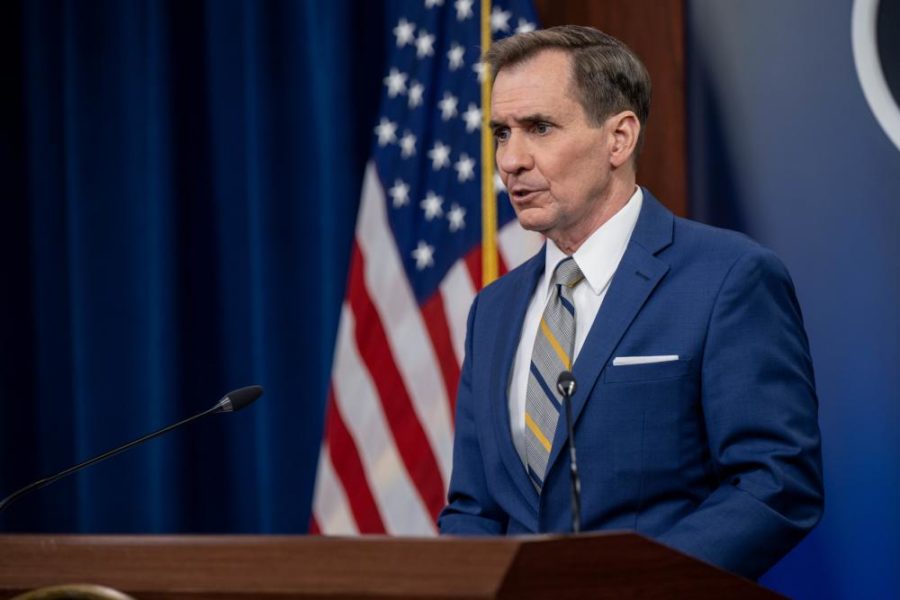A day after announcing it would cut back on military operations toward the Ukrainian capital of Kyiv, Russia had repositioned about 20 percent of its forces around the city.
Defense Department Press Secretary John F. Kirby offered the latest assessment during a press briefing March 30, warning that even with that movement, the Ukrainian capital remained at risk as Russia’s invasion of the country continued into its second month.
“Kyiv is still being attacked by bombardment: artillery fire as well as airstrikes. A majority of the forces that Mr. Putin put around Kyiv are still there,” Kirby said. “Now, as I said a couple of days ago, they’re largely in defensive positions. We several days ago stopped seeing any advancement on their part. They weren’t moving closer to the city. From a ground effort, there was no more advancing on Kyiv, but the airstrikes have not stopped, not at all.”
None of the Russian troops who have begun to leave, Kirby added, have returned to their “home garrisons” in Russia. Instead, some are still in Ukraine, and others have gone north into Belarus. From there, Kirby warned, they will likely be deployed again.
“We’re seeing units go, so it’s our assessment that they are also bringing much of their equipment with them … we believe for refit and repurposing for future operations inside Ukraine,” Kirby said.
Kirby’s comments echo those made by senior U.S. officials in the past few days in response to Russia’s supposed withdrawal from Kyiv. President Joe Biden told reporters March 29 that “I don’t read anything into it until I see what their actions are,” and Secretary of State Antony Blinken has suggested the statement could be a ploy.
Still, Air Force Gen. Tod D. Wolters, head of U.S. European Command, did confirm to members of the Senate on March 29 that “the shifting dynamics on the ground domain in the vicinity of Kyiv are exactly what we see from a EUCOM perspective.”
Intelligence Assessments
During his latest press briefing, Kirby also confirmed reports that U.S. intelligence has determined Russian President Vladimir Putin has been misinformed by his advisers about his military’s poor performance in Ukraine.
“We would concur with the conclusion that Mr. Putin has not been fully informed by his Ministry of Defense at every turn over the last month,” Kirby said. “Now, I want to caveat that: We don’t have access to every bit of information that he’s been given or every conversation that he’s had, and I’m going to be very careful here not getting into too much more detail on this. But we have seen these press reports attributed to a U.S. official, and we would concur with the basic finding.”
U.S. intelligence has repeatedly been at the forefront of the response to the conflict. The Pentagon sought to expose Russian activities and plans in the run-up to the invasion by publicly releasing information, and the White House reportedly modified rules so that agencies could share information and data with the Ukrainians once the invasion began.
At the same time, lawmakers have raised concerns that U.S. intelligence may have erred in overestimating the Russian armed forces. At the outset of the conflict, reports indicated fears that Kyiv would fall in days or weeks instead of putting up the fierce resistance that has materialized.
Asked by Sen. Roger Wicker (R-Miss.) in a Senate Armed Services Committee hearing if the unexpected turn of events indicated a gap in U.S. intelligence, Wolters acknowledged that there “could be.”
A day later, in front of the House Armed Services Committee, Wolters repeated that assessment.
“There could be a gap. And I think what we owe our citizens is, once we get into a post-conflict environment, is to go back and examine that very issue, to make sure if there is in fact a gap, we rectify it,” Wolters told Rep. Jackie Speier (D-Calif.). “But at this point, I agree with you that there was a degree of miscalculation, and it’s evidenced by the performance of the Russian military up to this point. And I think we need to be prepared to take a really good look at it.”
At the same time, Wolters acknowledged that trying to gather intelligence on Russia’s plans remains a daunting task.
“Just to be fair … the world of a 21st-century intel officer is very difficult. I often ask our intel professionals, ‘What is so and so thinking?’ And as we all know, a threat is defined as capability and intent, and part of that intent is what one human being is thinking,” Wolters said. “And given the structure of how Russia operates, it’s very difficult to determine where President Putin’s head was the entire time.”
Asked about Wolters’ comments, Kirby indicated there wouldn’t be a formal after-action review of the situation because the U.S. was not directly involved in the conflict, but he did say informal discussions were likely to take place. At the same time, Kirby pushed back on the notion that Ukrainian resistance was unexpected.
“Let’s not forget the training and the support that we have been giving the Ukrainians for the last eight years as they’ve been engaged in a hot war in the Donbas,” said Kirby. “And it’s not just us. The Brits, the Canadians, and other nations in Europe have also lent training support to the Ukrainians. So their success on the field of battle is not an accident. It’s the result of a lot of hard work over the last eight years.”

